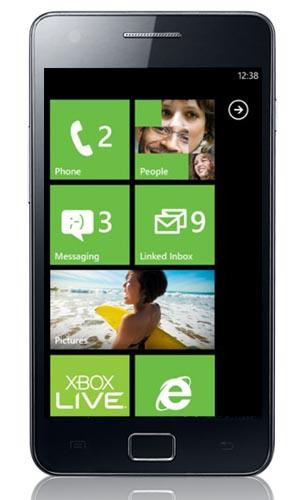
If we were to take a look at the mobile market today and try to narrow down the “champion” device for each mobile platform available in the United States, the search wouldn’t be hard for some, and pretty difficult for others. Especially when it comes to the likes of, say, Android. It would be easy for someone to argue with another Android fan about which Android-powered handset out there is the best, because the argument has a lot of different avenues of attack. Network of choice, physical statistics and even software version all come into play. But, for mobile operating systems like Windows Phone 7, the argument is probably more like a conversation, as software version isn’t really part of the equation. Which leads me to ask: Does Windows Phone even have a champion device, and can a Samsung Galaxy S II variant be that phone?
The original Samsung Galaxy S II is one of the most popular phones in the world right now. Its physical stats are truly impressive, and the fact that it runs the latest version of Android only adds to its popularity. So when rumors start spreading that a Galaxy S II device running Windows Phone “Mango” start swirling around, the excitement is obviously going to pick up. After all, that hardware with Microsoft’s latest version of their brand new mobile OS is probably a dream come true for some people. Especially to those who want the S II, but don’t necessarily want Android.
Microsoft has some pretty strict rules when it comes to Windows Phone and the hardware that can run it. It makes sense for Microsoft to express some control in this department, because it means that manufacturers can’t go crazy with the hardware and ruin the chances for the end user to get future updates for whatever reason. This is something that still plagues Android, and Microsoft wanted to make sure that they didn’t go down this road right from the start. Because of this, all current Windows Phone devices in the United States are able to get upgraded to Mango when it launches near the end of this year. So, despite the fact that there are several different manufacturers out there creating Windows Phone-based handsets, it’s a bit of work to find any that really stand out.
Of course, if we’re looking at physical stats only, then devices like the Samsung Focus and HTC HD7S stand out, thanks to the former’s 4-inch Super AMOLED display, and the latter’s 4.3-inch Super LCD panel. But, for the most part, every other Windows Phone 7 device out there is like the other, with their 1GHz processor and internal memory, which is unable to be expanded.
But, the Galaxy S II is a different story. That is, if we’re looking at the device for what it is now. Samsung packed a 1.2GHz processor under the hood, and the latest version of their proprietary TouchWiz user interface (4.0) into the device. Unfortunately, as many tweaks that Samsung included with the original S II, it’s a safe assumption that all of those won’t make it to the Windows Phone version. Why? Because Microsoft doesn’t allow for software customization, other than in specific Hubs (like HTC’s Windows Phone Hub), unless you’re Nokia. So, we shouldn’t expect to suddenly see TouchWiz 4.x skinning Windows Phone. But it’s certainly possible that 1.2GHz processor keeps things ticking along at a nice clip.
If Samsung is indeed planning on releasing an S II Windows Phone variant, then is it possible –if not entirely likely—that manufacturers like HTC are also planning high-end devices with these same specifications? If that’s the case, then a 1.2GHz-powered Windows Phone device won’t be that uncommon at all, and therefore a “champion” device will be just as hard to find in the future as it is now. And perhaps that’s one thing that Microsoft should be trying to find, specifically for the customer. Just like Google shows off Android in its purest form with the Nexus devices, perhaps Microsoft needs one name-brand lineage of devices to show off the real power of Windows Phone. Or, is Windows Phone even built for that to happen? Let me know what you think in the comments below.